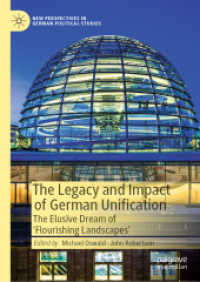- ホーム
- > 洋書
- > 英文書
- > Politics / International Relations
Full Description
In 2009, Ecuador became the first nation ever to enshrine rights for nature in its constitution. Nature was accorded inalienable rights, and every citizen was granted standing to defend those rights. At the same time, the government advanced a policy of "extractive populism," buying public support for mineral mining by promising that funds from the mining would be used to increase public services.
This book, based on a nationwide survey and interviews about environmental attitudes among citizens as well as indigenous, environmental, government, academic, and civil society leaders in Ecuador, offers a theory about when and why individuals will speak for nature, particularly when economic interests are at stake. Parting from conventional social science arguments that political attitudes are determined by ethnicity or social class, the authors argue that environmental dispositions in developing countries are shaped by personal experiences of vulnerability to environmental degradation. Abstract appeals to identity politics, on the other hand, are less effective. Ultimately, this book argues that indigenous groups should be the stewards of nature, but that they must do so by appealing to the concrete, everyday vulnerabilities they face, rather than by turning to the more abstract appeals of ethnic-based movements.
Contents
Acknowledgements
Chapter 1: Beyond Multiculturalism: Vulnerability Politics and the Environment in Latin America
Chapter 2: Multiculturalism Versus Polycentric Pluralism: Vulnerability Challenges Post-Materialist Values on Ecuador's Oil Extraction Frontier
Chapter 3: Does Prior Consultation Diminish Extractive Conflict or Channel It to New Venues? Evidence from Ecuador and the Andes
Chapter 4: Crude Bargaining: Indigenous Ambivalence Regarding Oil Extraction in the Ecuadorian Amazon
Chapter 5: How Science, Religion, and Politics Influence Indigenous Attitudes on Climate Change in Ecuador
Chapter 6: Exploring the Contradiction of Extractive Populism between Domestic and International Politics in Ecuador
Chapter 7: How to Effectively Speak for Nature?
Bibliography
Index








